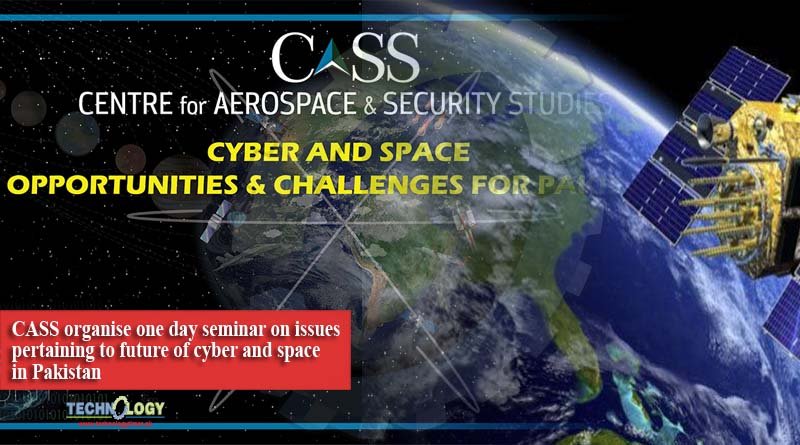Centre for Aerospace and Security Studies (CASS) organised one day seminar on “Cyber and Space – Opportunities and Challenges for Pakistan” at Serena Hotel Islamabad.
 Federal Minister for Science and Technology Chaudhry Fawad Hussain was a cheif guest of the seminar.
Federal Minister for Science and Technology Chaudhry Fawad Hussain was a cheif guest of the seminar.
He said while speaking on the occasion that we started SUPARCO in 1962 and sent Pakistan’s first rocket into space in 1963. Pakistan was the first country in South Asia to introduce mobile phones in the region whereas East Pakistan’s separation and engagement in Afghanistan had affected Pakistan’s development.
He further said that “Modern technology has created a new revolution and we need to focus on latest technology whereas we have kept our focus on military technology other than the civilian one. At present, we want to use military research and technology on the civilian side. I have also discussed this issue with the military leadership”.
Ambassador (R) Zamir Akram said in his keynote address at the seminar that Pakistan was highly vulnerable in cyber and space domains due to increasing militarization of the space by India. India’s anti-satellite missile test showed her ambitions to express power in the space which was a common heritage of mankind and should be declared as a non-militarized zone.
He added that “The developed and space-faring countries possessing space technology and knowledge are not willing to share with other countries on equal level for the peaceful use of space. In this scenario, Pakistan needs to depend on itself and develop both human resource and technological capacities to master the field of space and cyber advancement”.
He further said that we had to access international technologies through our cooperation with China on space.
Director CASS Air Marshal (R) Waseem ud Din said that India’s military aspirations of space was concerning for Pakistan as both India and China’s ambitious space programmes had direct implications on Pakistan.
He further said that “Pakistan is lagging behind in the field of space whereas it needs to revitalize space program to gain benefits of the socio-economic potential of space. Space technology and applications have revolutionized human life”.
He added that Pakistan has not been able to fully exploit opportunities under China Pakistan Economic Corridor (CPEC).
Chairman SUPARCO Maj Gen Amir Nadeem said SUPARCO was the national space agency of Pakistan that had two communication satellites. It had also international collaboration with various global space bodies and UN agencies.
He added that SUPARCO had also worked out a comprehensive National Space Programme (NPS-2047) whereas it was going to send first Pakistani astronaut on moon by 2022.
He said government support, financial constraints, technological denials, absence of private sector involvement, unregulated domestic market and lack of link among academia, industry and government were core challenges faced by the country to become space-faring nation.
